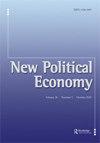Trade fetishism and the trade justice ratchet: between token and substantive change in NAFTA 2.0
IF 3.8
2区 经济学
Q1 ECONOMICS
引用次数: 0
Abstract
Countless socially responsible trade initiatives have emerged in recent years offering an uncertain mixture of token and substantive changes. After decades of battles over free trade, this marks a significant shift, challenging established debates over free versus regulated markets by promoting labour, gender, human, and environmental rights through trade agreements. This reorientation contains complex contradictions, with trade justice groups conceding to the popularity of trade while simultaneously insisting on a new vision of what trade is ‘about.’ Drawing on the idea of trade fetishism, this article argues that the desire for trade involves not only its material motivations, but its seductive content as a fetishised object of global capital, offering the fantasy of ‘trade’ as a symbolic source of pleasure. Through the case of the new NAFTA 2.0, it points to the relevance of trade politics that aspires not to overcome trade fetishism, but, as Lucas Pohl (Citation2022) suggests, to ‘get with’ it. Through a trade justice ratchet mechanism, advocates have pushed for unanticipated changes, while also ceding to the limitations of the current order. The outcome is a process of contesting the symbolic content of what trade is and is not about, with significant material and policy implications.贸易拜物教与贸易正义棘轮:在北美自由贸易协定2.0的象征性与实质性变化之间
近年来出现了无数对社会负责的贸易倡议,提供了象征性和实质性变化的不确定混合。在围绕自由贸易进行了数十年的斗争之后,这标志着重大转变,通过贸易协定促进劳工、性别、人权和环境权利,挑战了关于自由市场与受监管市场的既定辩论。这种重新定位包含着复杂的矛盾,贸易正义组织承认贸易的普及,同时坚持对贸易的新看法。借鉴贸易拜物教的观点,本文认为,对贸易的渴望不仅涉及其物质动机,还涉及其作为全球资本拜物教对象的诱人内容,提供了将“贸易”作为快乐的象征性来源的幻想。通过新的北美自由贸易协定2.0的案例,它指出了贸易政治的相关性,它不希望克服贸易拜物教,而是,正如卢卡斯·波尔(Citation2022)所建议的那样,“与之相处”。通过贸易公正棘轮机制,支持者们推动了意想不到的变革,同时也屈服于当前秩序的局限性。其结果是一个争论贸易是什么和不是什么的象征性内容的过程,具有重大的物质和政策影响。
本文章由计算机程序翻译,如有差异,请以英文原文为准。
求助全文
约1分钟内获得全文
求助全文
来源期刊

New Political Economy
Multiple-
CiteScore
10.10
自引率
9.50%
发文量
41
期刊介绍:
New Political Economy aims to create a forum for work which combines the breadth of vision which characterised the classical political economy of the nineteenth century with the analytical advances of twentieth century social science. It seeks to represent the terrain of political economy scholarship across different disciplines, emphasising original and innovative work which explores new approaches and methodologies, and addresses core debates and issues of historical and contemporary relevance.
 求助内容:
求助内容: 应助结果提醒方式:
应助结果提醒方式:


